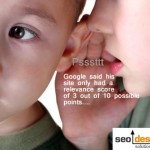 Knowing where people are looking is the first rule of search. SEO is only useful as a medium to deliver relevant consumers to your website. If it fails to do that, then it is obsolete as a viable solution for new business development. The second rule of search is understanding intent and how to intersect your message with the various types of relevant search queries of contextual keyword modifiers that a motivated consumer might use.
Knowing where people are looking is the first rule of search. SEO is only useful as a medium to deliver relevant consumers to your website. If it fails to do that, then it is obsolete as a viable solution for new business development. The second rule of search is understanding intent and how to intersect your message with the various types of relevant search queries of contextual keyword modifiers that a motivated consumer might use.
The keyword is merely a medium for attention and intent, yet if you transcend the mechanism of using keywords for PPC, organic SEO and minimize the noise, what you find is a simple desire and need to fulfill some type of objective (which is the driving force behind the search in the first place).
This is where the subtler nuances of SEO and targeting specific types of keywords or modifiers that inherently differentiate a searcher who is ready take action from a visitor that is just looking for a mere definition or simply looking for more information on a topic.
Although most people may surf randomly or move about the web in search of (1) a good post (2) something to entertain them or (3) use the internet as a way to voice their unique viewpoint of various topics. SEO’s are only concerned with one type of visitor, “the consumer”; and determining what the focal point of the consumer’s interest are and building a bridge between that intent and a conversion objective is the basis of the campaign.
This in itself is a moving target that requires constant research and refinement, a topic or product that is hot today may fade away next week (like a bad movie), so, understanding seasonality, market trends, click behavior, psychographic profiles and elements such as the state of the economy are all crucial components of how you (as a webmaster) should structure your offer.
Appealing to the right audience with the right message equates to (a) a great first impression (b) sales (c) trust and (d) the power for them to propel your brand, product or service as a result of them “buying in” to your point of view.
Translating topical interest to a motivated buyer who will actually pick up the phone, fill out a contact form or subscribe to one of your multiple a conversion funnels (like, send me more information about, enter name and email address) is the primary goal of a website immersed in commerce online.
To reach that state (where they are ready to do business), signals or trust, relevance and interest must pass the litmus test in order for them to subscribe to your conversion objective.
Search delivers traffic, but people are the driving force behind purchases and sales conversion. Having said that, make sure you don’t get too caught up in the mood or method and forget that you actually have to provide value once a visitor arrives. Miss that point and no amount of money invested in SEO, PPC advertising or online marketing will reap the rewards you anticipate.
Remember, you can determine someone’s path by their nature and someone’s nature by the path; which goes back to behavioral targeting and marketing 101. This implies that before you start an SEO campaign, keyword research should take the approach of the top-down model semantically, (meaning aim for the top, yet chip away at less competitive keywords). Yet, that research should still incorporate logical layers of relevance to position your website across the most likely path a motivated buyer may take (by using long-tail keywords, action words and modifiers).
Of the various species of media online, most content can essentially be placed into three categories.
- Educational Content
- Visual or Intellectual Content for Entertainment
- Personified Utilitarian Content or Content for Commerce
There is a place for each of these types of information or information exchange, but if conversion is your objective, then it’s more about presumptive awareness coupled with emotional triggers or hooks, designed to entice readers to move along the path of the desired action.
Depending on where they are in the sales cycle determines their need for solace (if a true problem/solution) transaction is at the basis of their search. Just as there is need to preach to the choir (since they already share the same mind set), using guerrilla conversion tactics on someone who is just looking for a definition does not aid your cause as well.
It is all about finding a happy medium between selling, informing a prospect and having enough personification implied by the word choice, imagery and feel of your website that contributes to how effective it will be as a tool for business.
So, before you go out and spend a bundle on SEO, PPC or Internet Marketing, take a fine-tooth comb through your primary landing pages in your website to see if the best interests or your brand are conveyed in the context of perception.
They say reality is what you make it, in this case, it is not just about you, it’s what they want that should be the first priority to facilitate the “action/reward modality” that encourages a user to “take you up on your offer” or simply move along if your content, images or website failed to hit their mark of unifying similarity in intent.













Great post. I like what you put it that: SEO being only a medium to deliver relevant consumers to website. I intend using post the next time I’m explaining this to someone. Thanks a lot